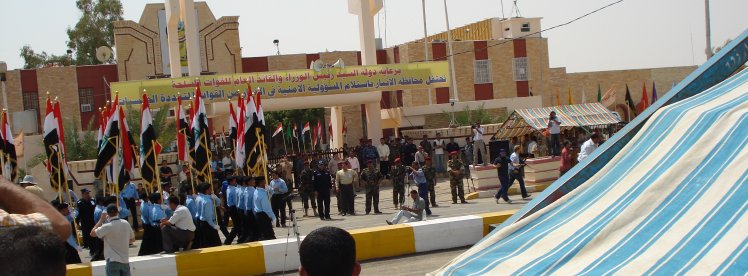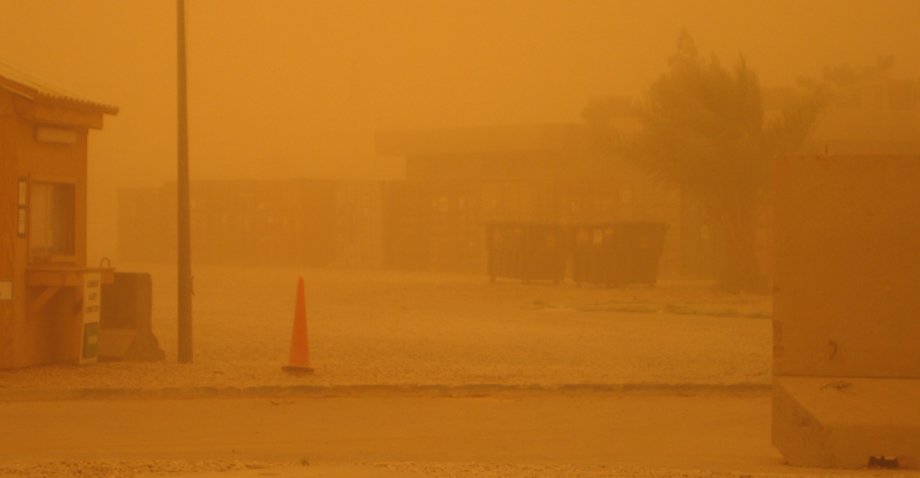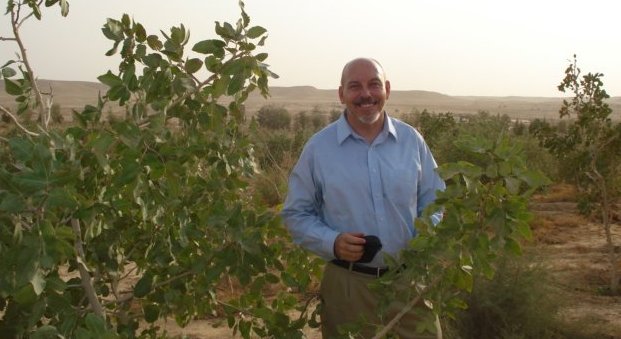Colonel Patrick Malay, my friend and colleague from Iraq, is coming to Washington and together we will make a presentation at the Strategic Communication Network (formerly known as Fusion Team) on May 29 about the importance of strategic communication in Iraq and how the Marines and the ePRT worked with the people and leaders of Anbar to help create stability and relative prosperity. Below is more or less what I plan to say.

Every move you make conveys a message and actions often speak louder than words. This is especially important in a disrupted and dangerous place like Anbar province was in 2007-8. But the words and how you express them are also important. You need a combination of talking and doing and that is what we were lucky enough to have in Western Anbar when the Marines, the State Department and other parts of the USG worked productively with the Iraqis to make the place safer and more prosperous.
I thought and wrote a lot about it at the time and I recommend you look at my webpage from the time. The passage of time has strengthened my conviction that we achieved something special. But I don’t think it was something unique and I do believe that the lessons of Western Anbar have meaning in other places and times.
All Necessary; None by itself Sufficient
As with many successes and most failures, it seems easier to see the causes when you look back than it was at the time of the events. We had a fortunate combination of factors. None of them alone would have been sufficient to achieve success, but each of them was necessary.
The most obvious is that the people turned against the insurgents and the Al Qaeda in Iraq (AQI). The insurgents and AQl, it turned out, really were bad. When their promises were replaced by the reality of murder, mutilation, rape & destruction, the people of Anbar realized that letting them get established had been a mistake. Unfortunately, standing up to the terrorists was dangerous and often fatal, not only for the brave individuals involved, but also for their family and friends. Early opposition ended up headless in roadside ditches. AQI would often even go after anybody who tried to remove the bodies. This was an example of AQI’s strategic communication. A headless body makes one hell of an impression, especially if you think you might be next.
Terrorism indeed created terror that paralyzed opposition. So the second part of the puzzle was needed – the surge.
The surge was more than just an increase in coalition troop numbers. It also coincided with a change in strategy. In Anbar, it meant that Marines protected the people locally and went to live in Iraqi communities among the people they were supposed to protect. They trained police & security forces and held the ground, but their most important strategic communication message was just being there. For civilian populations in war zones, the perception of safety is crucial. The perception of safety creates real safety as more people go onto the streets, interact with each other and begin to get the confidence to stand up to the bad guys or at least help others do so.
The supporting strategic communication message the Marines sent was consistency. The people needed to know that the Marines would be there for a long time. If the population suspects that coalition forces will leave and the bad guys will be able to return to chopping heads, nobody will cooperate. The only way you can create the perception that you are there for a long time is to be there for a long time and have the reputation for keeping your word. Marines stayed and established a reputation for honesty and persistence.
So we have two necessary parts of the puzzle. The people have turned against AQI and the greater numbers of coalition forces are making it to be both openly against the terrorists and alive at the same time. Both these things are necessary and probably in that order. But we still need something more.
Although basic stability always precedes prosperity, stability cannot be long maintained if the people are miserable and have no meaningful economic activity. Stability and prosperity are symbiotic and mutually reinforcing. This is where our ePRT came in. A PRT certainly cannot create prosperity, but we could help create conditions where the Iraqis could build, or rebuild, their own prosperous community.
We did this by emphasizing the structure of a civil society. These are the things that are so ubiquitous in our own society that we rarely even notice them anymore, things like a functioning court system, protections for private property, transportation, clean water, distribution of goods and a reasonable functioning financial system.
Let me say again that we did not, we could not, create this kind of thing. We could, however, help the Iraqis do it for themselves. We could and did make grants of money. We sponsored training. We (and even more the military) physically built things like schools, roads and bridges, but I content that the thing that made all these activities into a successful whole was strategic communications. There is really not much we did for the Iraqis that they could not have done for themselves. But the fact that we were out there encouraged them and paved the way for progress.
It is Better to Light a Single Candle than to Curse the Darkness

Let me give one example. It is not the most important example, but it is the one I like the best. I called it the “String or Emeralds”. You can see more about it at the String of Emeralds Link.

Iraq is an arid country, plagued by dust storms and drought. But the dust storms and drought are not completely natural. Some is caused by humans and livestock destroying the natural vegetation cover by bad farming methods and overgrazing. This has been a problem for 4000 years and our PRT could not solve it. But after 4000 years, we have learned something about soils. Our PRT’s agricultural attaché was an expert on rehabilitating irrigated dry soils damaged by salinization (salts deposit is a big problem in dry Iraq). We also took the lessons from our own dust bowl of the 1930s. Planting trees serves to slow the wind and catch some of the blowing dirt. I looked for opportunities to help and I found some. The Iraqis understood the need for this too, but the effort had been neglected under Saddam Hussein and collapsed utterly during the war.
We went to some of the oases and raised the profile and that encouraged the Iraqis to think more about it too. The strategic communications lesson is that when someone in authority just shows interest, things can happen. There is no real magic to it. It just takes effort. The trees will grow and the future will be better than the past.
This is my Western Anbar progress report from about the time I left. You can get a better idea if you look at the sections.
When does strategic communication work? The short answer is when it is embedded in other things that are working. All the talking in the world could not have made Western Anbar safe if not for the Marines & our brave Iraqi friends. But communications enhanced and spread the good news. And by spreading it and making it believable the perception of security started to become more real. Telling the right stories creates a reinforcing loop, a virtuous circle or just plain success.
